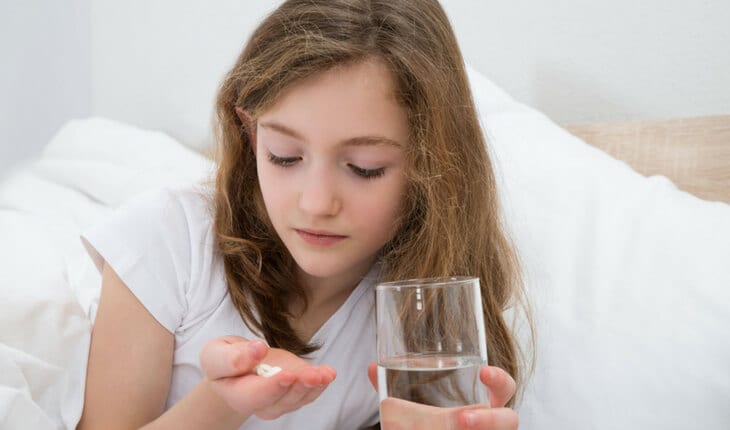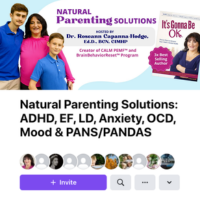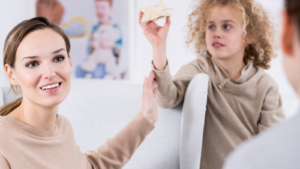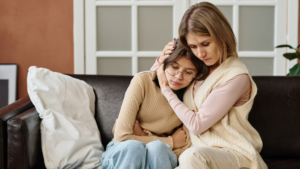Parenting is just like any other job. To do it right, you need the right tools. Finding the right tools, however, can be a challenge for parents whose children struggle with Attention-Deficit Hyperactivity Disorder (ADHD). ADHD often feels like a battle yet comes with many gifts. However, these children and teens can be frustrating because their Central Nervous System leads them to being maybe impulsive, hard to motivate, unfocused, and emotional. All of these ADHD symptoms can create peer and academic issues., etc., which parents need the right tools to help support their kids.
Because our whole mental health system has broken down and medication is often the first and only treatment offered, a parents first step really should be meeting with a psychologist, who can offer parents support and obtain resources. A push toward medication usage is the norm in every facet of mental health.
The typical provider simply doesn't know about biomedical approaches and thus isn’t conveying that information. In 2012, the American Academy of Pediatrics gave Neurofeedback a Level 1 effectiveness rating in the treatment of ADHD in children, which is the same effectiveness as medication, yet most physicians aren’t telling parents this.
At our office in Ridgefield, CT and virtually we support families from all over the region and the world by providing effective brain-based alternatives to medication, including Neurofeedback, PEMF therapy, Psychotherapy, Executive Functioning and Parent Coaching, among other treatments.
We are honored to offer parent coaching because sometimes parents need to find ways to support their child (or two) that need something from them. We not only give parents tools, but we teach them about how to use those tools to support their child’s brain and body. Ultimately, these effective solutions can improve attention, focus, and executive functioning.
#1 ADHD Medication Side Effects Harm Kids
Many parents don’t realize that Ritalin and Adderall, the most popular on the ADHD medication list, are stimulants.
Despite the widespread belief that medications for ADHD are relatively safe, the research says otherwise, as there are hidden dangers of ADHD medications. The research demonstrates that your child will likely have a side effect from the medication. Side effects range from reduced eating and growth, irritability, rage, and personality changes to psychotic behaviors. In one 2014 study, 100% of all participants developed at least one adverse reaction.
The most common side effects associated with stimulants in this study were reduced eating (or anorexia), irritability, and insomnia. Parents often tell me that their child’s personality changed and or that they stopped eating after beginning ADHD medications. These adverse reactions can be temporary (reduced appetite) or last (tics, mood issues, etc.).
As I dive into should I medicate my child with ADHD in my book, “Its Gonna Be OK!”, the scariness of adverse reactions often is the turning point for parents to find more effective and holistic remedies for ADHD, such as neurofeedback and other natural solutions to help someone with ADHD focus.
#2 Your ADHD Child is Diagnosed Incorrectly
No definitive test diagnoses ADHD, and often professionals diagnose children after just a clinical interview. However, your child’s impaired attention may occur for a variety of reasons with ADHD being only one.
ADHD symptoms in kids often look the same as the ones for children with anxiety, OCD, learning difficulties, depression, Autism, sensory processing, birth trauma, PTSD, nutritional deficiencies, and genetic issues because they might be having a hard time focusing or controlling impulses.
A child or teen may not even have a clinical issue and instead may be reacting to developmentally inappropriate school work or the wrong classroom or peer environment. Prescribers listen to the symptoms and give you a medication based on that which often leads to a trial and error approach to see if the medication works or not.
There are other more effective means of assessing if a child has ADHD. Research demonstrates that a QEEG brain map is 89% accurate as a diagnostic test of ADHD versus behavioral rating scales which are 47 to 58% accurate. Behavioral rating scales are not only subjective, they only give us a glance as to what is impacting the CNS, especially since ADHD in adults is different than in children.
Starting with a QEEG brain map is a great way to know diagnostically what the real issues are. By objectively looking at the brain waves, we can see what is impacting the Central Nervous System and causing dysregulation and thereby get a clearer diagnostic picture. When we know what is going on diagnostically, then the right treatment can happen.
#3 Psychostimulants Can Hurt the Brain
Parents try ADHD drugs because they want to help their diagnosed child or teen and aren’t presented with other clinical ADHD treatment options. They typically have no idea of the potential of these medications for damaging the CNS.
According to research, repeated exposure to a variety of psychoactive stimulants may produce profound behavioral changes as well as structural and neurochemical alterations in the brain that may persist long after drug administration has ceased. In other words, psychostimulants can produce changes in the brain the cause the CNS to respond differently, which can cause persistent negative behaviors.
For some teens, the ADHD medications for children become a gateway to later drug usage because the stimulants alter the brain structure creates a chemical imbalance that reinforce a drug dependence leading to addiction. Due to the chemical changes resulting from stimulant use, the brain creates a spontaneous hypersensitivity to the drug, which creates compulsive and addictive behaviors.
We simply don’t know enough about why some brains have a spontaneous hypersensitivity but suspect a genetic component, and therefore the use of stimulants may not be worth the risk of addiction especially with a family history of addiction. Methylphenidate- induced neurotoxicity can alter synaptic and neuronal plasticity, as well as affect cellular energy metabolism, which in tern impacts how the CNS regulates behavior.
#4 Holistic Therapies for ADHD Are Effective
Understanding that the Central Nervous System causes the problem is the first step to finding better tools for your child. Other equally effective therapies are available, including Neurofeedback, which have virtually no known side effects. Unfortunately, physicians, psychologists, therapists, and school personnel just aren’t being taught about these treatments.
As shocking as this sounds, the average physician has not had one course in nutrition. A mom recently told me that her physician said to her, “There is no validity in dietary changes and its impact on behavior.” Despite good marketing by Big Pharma, more effective treatments than ADHD medication for children exist and the CNS can be regulated through these clinically valid therapies.
Numerous research studies demonstrate that our Western diet is associated with increased symptoms of ADHD in kids. Changes in diet and nutrients can have a huge impact on focus and self-regulation. Irritants and deficiencies can wreak havoc on the Central Nervous System (CNS) and can cause someone to be highly unfocused. Identifying through lab work what are things that could be irritating your systems, such as food or environmental toxins, or missing nutrients, can be a real game-changer in supporting the brain to self-regulate.
Homeopathy for ADHD can also support the ADHD brain. Many wonder if brands like Brilla side effects but homeopathy is generally considered safe. Homepathy is a different kind of medicine where the idea is to heal with “like with like.” It's like using a tiny bit of somthing to heal the body from that same thing.
Neurofeedback is a highly researched and effective treatment for ADHD, as documented through 3,000 peer-reviewed studies. Through the use of computers, brain functioning is monitored, and that live feedback is shown to the client. They are trained to promote or reduce different brainwave frequencies; then the brain is rewarded for changing its activity to produce more appropriate patterns.
Through this reinforcement, new electrical activity is produced in the brain, and the brainwave activity is “shaped” toward a more desirable, more regulated performance. These changes result in symptom reduction, as the brain learns to self-regulate.
Research demonstrates that Neurofeedback reduces symptoms up to 90 percent of the time. With the reduction of symptoms though teaching the brain to self-regulate, children and teens can be the best possible version of themselves.
#5 Psychotherapy and Coaching is Needed for Children with ADHD
Children need to be directly taught skills to support their deficit areas, and medication isn’t a substitute for that. Helping someone be more focused doesn’t mean their behaviors will change. Over time, they can learn new ways to approach or manage a situation or task, especially when they lack executive functioning skills.
Executive functioning training, study skill support, social skills training, emotional and behavioral support and academic remediation are all common areas that children and teens with ADHD are lagging. Finding executive functioning interventions can be challenging, but children and teens with attentional, learning, social, or behavioral issues. need to learn new ways to regulate their behavior, how to follow directions, manage stress and anxiety, or get along with others and this occurs through the support of individual and/or parent therapy.
That pairing of regulating the nervous system with new learning is the foundation of Dr. Roseann's trademarked BrainBehaviorReset™ Method and why so many of our clients achieve symptom reduction* because they become both alert and learn a new way to respond.
While parents are often disappointed that their child isn’t “magically better” with ADHD pills, they need to understand that their child needs to be supported in learning new ways to act and think that leads to success. This takes time and guidance and starting with a psychotherapist for child and parent coaching is the way to go. The good news is that children and teens with ADHD are often very intelligent and capable of learning, they just need direct skillset instruction.
Whether the issue is a minor issue that keeps coming up and limiting your kids success or they are in crisis learning new skills is an important part of Dr. Roseann's trademarked BrainBehaviorReset™ Method. When in crisis, we do short-term intensives with clients to give them the wrap around support that they need to help clients make that necessary shift toward new behaviors.
Understanding the Long-Term Effects of ADHD Medications for Your Child
As parents, it's important to understand the long-term implications of ADHD medications for your child. Stimulant drugs like methylphenidate and amphetamine-based Adderall, as well as non-stimulant ADHD medications, each have distinct impacts. When considering treatments like Vyvanse or prolonged Adderall use for ADHD, it's crucial to weigh their potential therapeutic benefits against possible long-term side effects. These effects can range from changes in brain function and structure to overall physical health impacts.
It's also essential to recognize how ADHD medications affect children differently from adults. For instance, the long-term use of Ritalin might have specific side effects in children, contrasting with its effects in adults. Understanding the full spectrum of long-term effects of various ADHD drugs, including stimulant and non-stimulant options, can help in choosing the right treatment path.
Particularly concerning is the impact of long-term stimulant use on a child’s brain chemistry, especially in relation to neurotransmitters like dopamine and norepinephrine. Apart from neurological effects, these medications can affect a child's physical growth, cardiovascular health, and psychological state, potentially leading to mood swings, anxiety, or dependency.
As you navigate the choices of ADHD treatment for your child, consider both the short-term relief these medications offer and their long-term consequences. This balanced approach is vital for making informed decisions about your child's health and well-being, ensuring that immediate benefits are weighed against future considerations. Always consult with healthcare professionals to tailor the treatment plan to your child's unique needs, keeping an eye on both present improvements and future outcomes.
To answer the question, “Should I medicate my child with ADHD” is a personal one but there are science-backed alternatives for a developing brain. To learn more about how to help your child with ADHD, listen to my ADHD podcast series and listen to Alex's story how his mother healed his brain and changed his ADHD behavios without medication.
Always remember… “Calm Brain, Happy Family™”
Are you looking for SOLUTIONS for your struggling child or teen?
Dr. Roseann and her team are all about science-backed solutions, so you are in the right place!
Grab your complimentary copy of
147 Therapist-Endorsed Self-Regulation Strategies for Children: A Practical Guide for Parents
There are 3 ways to work with Dr. Roseann:
Dr. Roseann is a Children’s Mental Health Expert and Licensed Therapist who has been featured in/on hundreds of media outlets including The Mel Robbins Show, CBS, NBC, PIX11 NYC, Today, FORBES, CNN, The New York Times, The Washington Post, Business Insider, Women’s Day, Healthline, CNET, Parade Magazine and PARENTS. FORBES called her, “A thought leader in children’s mental health.”

She coined the terms, “Re-entry panic syndrome” and “eco-anxiety” and is a frequent contributor to media on mental health.
Dr. Roseann Capanna-Hodge has three decades of experience in working with children, teens and their families with attention-deficit hyperactivity disorder (ADHD), autism, concussion, dyslexia and learning disability, anxiety, Obsessive Compulsive Disorder (OCD), depression and mood disorder, Lyme Disease, and PANS/PANDAS using science-backed natural mental health solutions such as supplements, magnesium, nutrition, QEEG Brain maps, neurofeedback, PEMF, psychotherapy and other non-medication approaches.
She is the author of three bestselling books, It’s Gonna Be OK!: Proven Ways to Improve Your Child's Mental Health, The Teletherapy Toolkit, and Brain Under Attack. Dr. Roseann is known for offering a message of hope through science-endorsed methods that promote a calm brain.
Her trademarked BrainBehaviorResetⓇ Program and It’s Gonna be OK!Ⓡ Podcast has been a cornerstone for thousands of parents facing mental health, behavioral or neurodevelopmental challenges.
She is the founder and director of The Global Institute of Children’s Mental Health, Neurotastic™Brain Formulas and Dr. Roseann Capanna-Hodge, LLC. Dr. Roseann is a Board Certified Neurofeedback (BCN) Practitioner, a Board Member of the Northeast Region Biofeedback Society (NRBS), Certified Integrative Mental Health Professional (CIMHP) and an Amen Clinic Certified Brain Health Coach. She is also a member of The International Lyme Disease and Associated Disease Society (ILADS), The American Psychological Association (APA), Anxiety and Depression Association of America (ADAA) National Association of School Psychologists (NASP), International OCD Foundation (IOCDF).
© Roseann-Capanna-Hodge, LLC 2023
Disclaimer: This article is not intended to give health advice and it is recommended to consult with a physician before beginning any new wellness regime. *The effectiveness of diagnosis and treatment vary by patient and condition. Dr. Roseann Capanna-Hodge, LLC does not guarantee certain results.
















